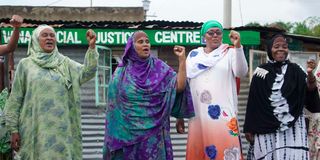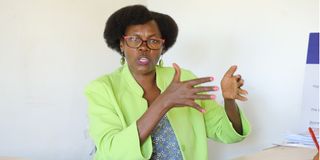How rights defenders help SGBV survivors get justice

Members of Winam Social Justice Centre in Kisumu on November 6, 2023. The human rights defenders help sexual and gender-based violence survivors to access justice through a robust advocacy campaign.
What you need to know:
- Sexual violence against girls and women has been on the rise in Kisumu, Busia, Bungoma, Kakamega and Vihiga counties.
- Human rights defenders have become the beacon of hope for survivors.
Many survivors of sexual and gender-based violence in western Kenya are getting justice, thanks to a robust campaign by human right defenders.
Human rights defenders have become the beacon of hope for survivors in Kisumu, Busia, Bungoma, Kakamega and Vihiga counties where sexual violence against girls and women has been on the rise.
Through social justice centres, they conduct campaigns to deliver justice.
Karen Kiarie is the convener of Nyando Social Justice Centre in Ahero town, Kisumu County. She has been at the forefront of helping survivors.
Ms Kiarie, through the centre, has been rescuing victims of sexual violence and helping the police in documenting evidence, including taking the survivors to hospital for medical attention.

Ms Karen Kiarie, a human rights defender, during an interview with Nation.Africa in Ahero town, Kisumu County, on November 7, 2023.
“We are always there to rescue victims who are under threat from perpetrators or their relatives. Due to such threats, parents or guardians usually fear to follow up the cases and that is where we come in. We also do citizen arrests of perpetrators and hand them over to the police,” she tells Nation.Africa.
Since 2019, Ms Kiarie says, the centre has handled about 520 cases, most of them pending in court. She, however, notes that there have been many convictions as a result of their interventions and proper documentation of evidence.
Ms Kiarie says most sexual violence cases are defilement, revealing that in a week, they receive at least three.
“We have many cases still being thrown out and perpetrators being acquitted because of poor collection and preservation of evidence. Not all evidence collected usually gets to government chemists on time. Police officers are also not writing or recording statements properly, thus creating some gaps.”
Fatuma Nyerere, a human rights defender on Kaloleni estate in Kisumu, is another woman who has won accolades for the work she is doing to help survivors get justice.
Ms Nyerere, a member of the Children’s Court Users Committee, says she looks for sexual and gender-based violence (SGBV) cases that have stalled and seeks to revive them by filling in the missing gaps.
The rights defender, who is also the convener of Winam justice centre in Kaloleni, further gives paralegal services to survivors through basic legal knowledge or advice on how to go about and pursue SGBV cases.
Her organisation also refers survivors to well-wishers for legal aid and medical attention, besides doing case management for them, a process that involves walking with them through the case until they get justice.
“We have also been doing a lot of advocacy through awareness campaigns on the need for justice for SGBV survivors. Due to this, we now have a 75 per cent success rate in access to justice cases. Over 50 cases have been successful.”
hundreds of kilometres away in Itandalo village, Vihiga County, Tom Onzere is also advancing the noble cause of ensuring survivors get justice.
Mr Onzere, a member of the court users’ committee, has been working tirelessly to ensure there is no conflict among stakeholders in the justice system: The Judiciary, the Office of the Director of Public Prosecutions and the police.

Mr Tom Onzere, a human rights defender in Vihiga County and convener of Magharibi Social Justice Centre.
Being the convener of the Magharibi Social Justice Centre, he says he has been doing his human rights advocacy in Vihiga, Bungoma, Kakamega and Busia counties. The four counties, he adds, have 10 social justice centres.
“We have been the eyes and voices of the voiceless in society. This is why those violated in the community come to us to lodge complaints. The existence of kangaroo courts is still an impediment to access to justice for many survivors of sexual violence,” Mr Onzere tells Nation.Africa.

Members of the Magharibi Social Justice Centre, led by Tom Onzere, in Itandalo village Vihiga County, on November 10, 2023. The human rights defenders, among other things, give paralegal services to GBV survivors.
To help curb rampant cases of SGBV, UN Women, in conjunction with the Italian Agency for Development Cooperation, has been undertaking a project to build the capacity of some of the duty bearers.
UN Women Kenya County Representative Anna Mutavati says while the initial focus of the project was on preventing and responding to violence against women during elections, counties, the scope broadened to strengthening prevention and response efforts for gender-based violence with emphasis on improving access to justice systems, and empowering women as leaders in peace building initiatives.
“We have built the capacity of stakeholders such as health, police, and judiciary professionals among others to offer high-quality services that respond to the needs of GBV survivors. Additionally, we have supported survivors in accessing legal, health, counseling, and shelter services. We have improved coordination among stakeholders working in prevention and response to GBV,” Ms Mutavati says.
She notes the project has contributed to ending impunity by encouraging community dialogues to reject harmful practices. “We have also built the capacity of the justice system to deliver justice for survivors without delay.”
The UN Women boss observes that poverty and lack of viable livelihoods are driving GBV, a situation worsened by the current economic climate, which has brought increased financial stress for families, further exposing women and girls to vulnerabilities.
Lack of a uniform GBV data system where all service providers can share and use collected data is another serious problem that hampers follow-up efforts, she adds.
Zara Chebet, also a human rights defender in Kaloleni, was recently a key witness in a defilement case involving an 11-year-old girl. She took the girl to hospital and took the P3 form for her, thus becoming a key witness.
She and other players in the justice system have come up with a new method that allows survivors to get justice faster in court. It ensures that immediately after a suspect is charged with sexual violence, the survivor and key witnesses take the stand the same day.
“The new method is very effective in helping survivors of sexual and gender-based violence get instant justice. The case in which I was a witness, for example, only took one-and-a-half months to be completed. The perpetrator was eventually jailed for 15 years,” Ms Chebet says.
She says that since the court introduced the new method in administration of justice, sexual violence-related cases have slightly gone down.
“People now fear that once they violate girls and they are subjected to the court process, justice will be served within a very short time unlike in the past where such cases took years to be completed.”
Mr Giovanni Grandi, the head of the Italian Agency for Development Cooperation Regional Office in Nairobi, says that without ambitious investments to scale up prevention programmes, effective policies, and provision of support services to address violence against women and girls, countries will fail to end GBV by 2030.
“This year we launched the third phase of the ‘Let It Not Happen Again’ project, which brings our total commitment to this very successful initiative to a staggering 2.7 million Euros (Sh446 million); and recently we launched an initiative worth 4 million euros (Sh650 million) specifically targeting women’s empowerment, improving health and environmental sustainability in arid and semi-arid lands,” Mr Grandi tells Nation.Africa.
“Residents here are all praise for the human rights defenders because of the work they are doing to help survivors get justice,” says Valentine Nanjala, a resident of Vihiga County.
“The rights defenders have been doing a commendable job. Due to the work, we are seeing cases of sexual violence starting to come down. They need to be empowered more through capacity building to help them be more impactful,”





